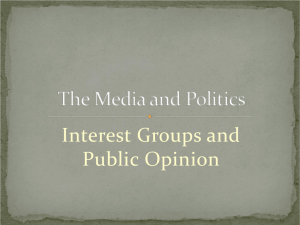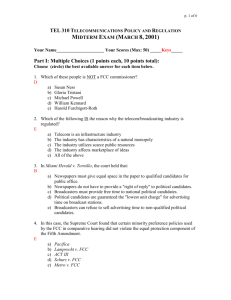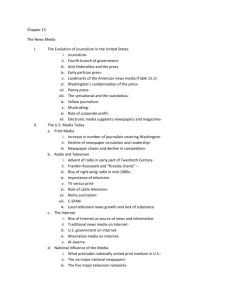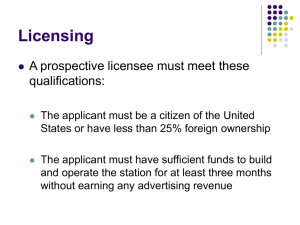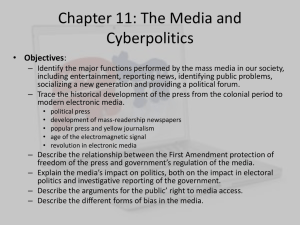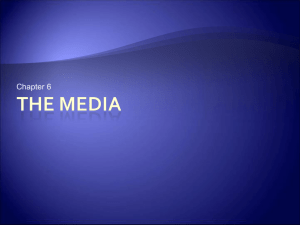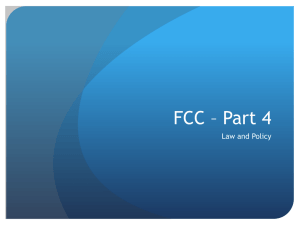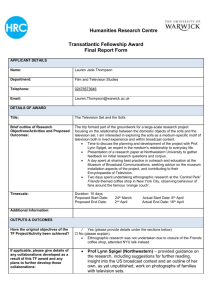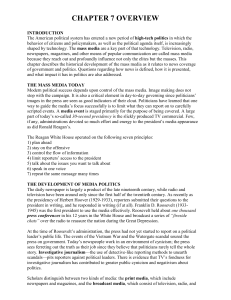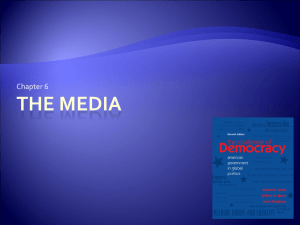Political Parties, Interest Groups, and Mass Media
advertisement
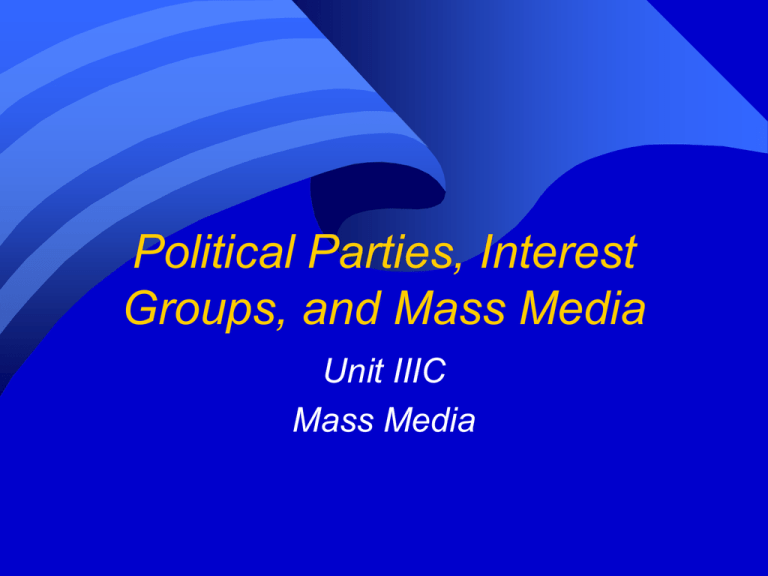
Political Parties, Interest Groups, and Mass Media Unit IIIC Mass Media Mass Media Includes all forms and aspects of communication to the general public Considered the “fourth branch of government” given the importance and influence on the electorate, policymaking, politics, and the government Mass Media Development Newspapers Colonial and Early Republic Times – Small circulations – Expensive – Financed by politicians and interest groups Modern Times – Telegraph and printing developments increased circulations on national levels by late 19th century – Yellow journalism – Limited press due to television and internet Mass Media Development Magazines Developed in mid-19th century with smaller circulation and limited publishing Gained influence with muckraking articles during Progressive Era After 1920s, national circulation – Time, Newsweek, U.S. News and World Report Mass Media Development Radio Developed in early 20th century Primary source of news and event broadcasts for early and mid-20th century FDR used radio for fireside chats Lost influence with television Mass Media Development Television After WWII, television became primary source for news and event broadcasts Helped glorify journalists Claims largest mass media audience Broadcast of McCarthy hearings, Nixon-Kennedy debates, and Vietnam coverage solidified television in political spectrum Narrowcasting, cable news, and 24/7 news cycle in late 20th century – Talking heads Mass Media Development Internet Development in late 20th century and early 21st century World Wide Web becoming growing source of news and information Blogs Subject to immense bias and limited factual credibility Function of Mass Media Provide information to the public Influence and shape public opinion Link the government and the public Act as a watchdog of the government Influence agenda setting Role of National Press Gatekeeper – Influencing or determining which issues receive attention or degree of attention – Part of agenda setting Scorekeeper – Tracking candidates or issues showing their importance or significance over time – Ex. Polls on leading Republican presidential candidates Watchdog – Investigating and exposing candidates and institutions – Ex. Watergate Media and the President The President receives the most attention by the media Media Events Press Secretary Sources of Information – – – – News/press releases News briefings News conferences Leaks Media and Congress Limited coverage in relation to President Coverage of confirmation hearings, oversight investigations, scandals C-SPAN Mass Media Jargon Media event Sound byte Loaded language On the record Off the record On background On deep background Trial balloon Kill a leak Regulation of Media Technical – Licensing, signal strength, digital conversion Structural – Organization and ownership of broadcast media outlets Content – Limitations on coverage of subjects Federal Communications Commission (FCC) Federal Communications Act of 1934 established FCC as independent regulatory agency on interstate communication Enforces technical, structural, and content regulations Technical Regulation Public owns the airwaves Anything transmitted over the airwaves is subject to regulation Radio and television broadcasters must obtain a license renewable every 5 years – Subject to hearing if a group objects/complains Digital conversion – Digital Transition and Public Safety Act of 2005 – All over-the-air broadcasts must end analog transmissions and convert to digital Structural Regulation Media Consolidation – Before 1980s, media monopolies were strictly enforced and prohibited – A corporation could not monopolize an entire market Telecommunications Act of 1996 – Deregulated limitations on corporations – Led to fewer but larger media conglomerates Content Regulation Political Campaigns – Fairness Doctrine Mandated broadcast of opposing views Dismissed by FCC in 1987 – Equal Time Rule Media time must be equally granted, media costs must be equal, commercial ads must be the same during candidate air time – Right of Rebuttal Candidates have the right to opportunity to respond to allegations made by an opposing candidate Content Regulation Public Decency – FCC imposes fines and may revoke licenses in violation of decency standards set by law – Obscenity prohibited – Profanity prohibited between 6AM and 10PM – Only enforced on overthe-air broadcasts; cable not subject 2004 Super Bowl XXXVIII Halftime Show First Amendment Prior Restraint – Government prohibited from censoring or refusing publication/broadcast – Near v. Minnesota (1931) – New York Times v. United States (1971) Pentagon Papers Libel – Malicious printed material is not protected Slander – Malicious oral material is not protected Media Bias Coverage and reporting of issues and candidates slanted by “liberal” reporters and/or “conservative” media owners Sensationalism over objectivity Actual News Headlines vs. Fox News Headlines Media Bias
